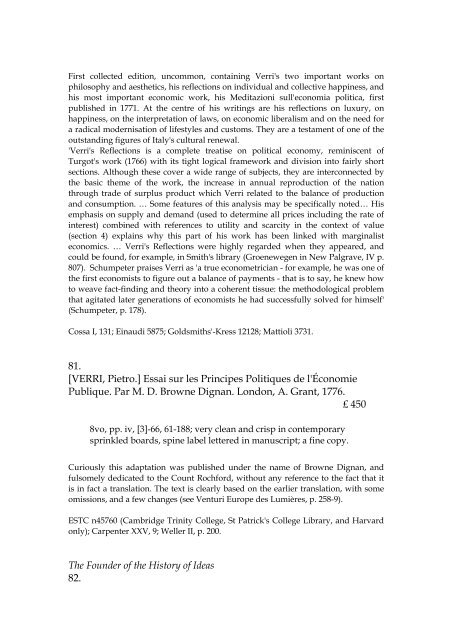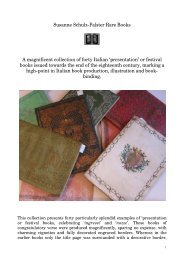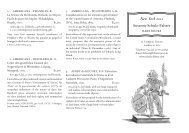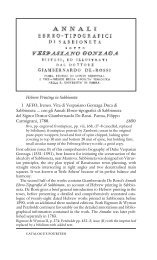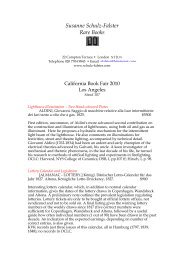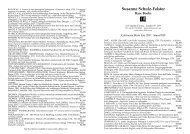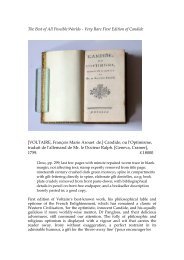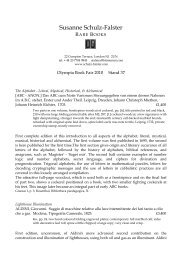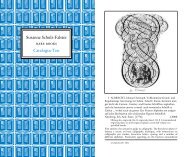«Merge Record #»«Title» - Schulz-Falster Rare Books
«Merge Record #»«Title» - Schulz-Falster Rare Books
«Merge Record #»«Title» - Schulz-Falster Rare Books
You also want an ePaper? Increase the reach of your titles
YUMPU automatically turns print PDFs into web optimized ePapers that Google loves.
First collected edition, uncommon, containing Verri's two important works on<br />
philosophy and aesthetics, his reflections on individual and collective happiness, and<br />
his most important economic work, his Meditazioni sull'economia politica, first<br />
published in 1771. At the centre of his writings are his reflections on luxury, on<br />
happiness, on the interpretation of laws, on economic liberalism and on the need for<br />
a radical modernisation of lifestyles and customs. They are a testament of one of the<br />
outstanding figures of Italy's cultural renewal.<br />
'Verri's Reflections is a complete treatise on political economy, reminiscent of<br />
Turgot's work (1766) with its tight logical framework and division into fairly short<br />
sections. Although these cover a wide range of subjects, they are interconnected by<br />
the basic theme of the work, the increase in annual reproduction of the nation<br />
through trade of surplus product which Verri related to the balance of production<br />
and consumption. … Some features of this analysis may be specifically noted… His<br />
emphasis on supply and demand (used to determine all prices including the rate of<br />
interest) combined with references to utility and scarcity in the context of value<br />
(section 4) explains why this part of his work has been linked with marginalist<br />
economics. … Verri's Reflections were highly regarded when they appeared, and<br />
could be found, for example, in Smith's library (Groenewegen in New Palgrave, IV p.<br />
807). Schumpeter praises Verri as 'a true econometrician - for example, he was one of<br />
the first economists to figure out a balance of payments - that is to say, he knew how<br />
to weave fact-finding and theory into a coherent tissue: the methodological problem<br />
that agitated later generations of economists he had successfully solved for himself'<br />
(Schumpeter, p. 178).<br />
Cossa I, 131; Einaudi 5875; Goldsmiths'-Kress 12128; Mattioli 3731.<br />
81.<br />
[VERRI, Pietro.] Essai sur les Principes Politiques de l'Économie<br />
Publique. Par M. D. Browne Dignan. London, A. Grant, 1776.<br />
£ 450<br />
8vo, pp. iv, [3]-66, 61-188; very clean and crisp in contemporary<br />
sprinkled boards, spine label lettered in manuscript; a fine copy.<br />
Curiously this adaptation was published under the name of Browne Dignan, and<br />
fulsomely dedicated to the Count Rochford, without any reference to the fact that it<br />
is in fact a translation. The text is clearly based on the earlier translation, with some<br />
omissions, and a few changes (see Venturi Europe des Lumières, p. 258-9).<br />
ESTC n45760 (Cambridge Trinity College, St Patrick's College Library, and Harvard<br />
only); Carpenter XXV, 9; Weller II, p. 200.<br />
The Founder of the History of Ideas<br />
82.


